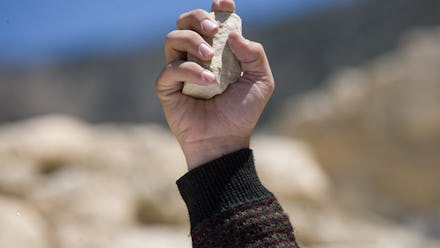Women Around the World Are Being Stoned to Death. Do You Know the Facts?

On July 11, Arifa Bibi, a young mother of two, was stoned to death in Pakistan. Her only "crime" was possessing a cellphone. In response to Bibi's killing, and others like it, a movement is building. More than 10,000 people have signed a petition calling on the UN to eradicate this inhumane punishment. As Arifa’s story shows, stoning is as prevalent today as it has ever been. Understanding why and how this practice occurs is crucial to tackling it. Here are the answers to common questions about stoning. You can learn more about the fight to eradicate stoning by visiting Women Living Under Muslim Laws.
1. What is stoning?
Stoning (also known as lapidation) is a form of execution. It is a method by which a group throws stones at a person until they are dead.
2. Surely that doesn't happen anymore? It's 2013...
Stoning still happens today. There are 15 countries in which stoning is either practiced or authorized by law, even if it has never been practiced. In Iran, Mauritania, Nigeria (in one-third of the country's states), Pakistan, Qatar, Saudi Arabia, Somalia, Sudan, the United Arab Emirates, and Yemen, stoning is a legal punishment. However, out of these countries, only in Iran, Pakistan and Somalia have stonings actually occurred, and all instances in Pakistan have occurred outside the legal system.
By comparison, three of the remaining five countries (Afghanistan, Iraq, and Mali) do not condone stoning in national legislation, but sentences and executions have been carried out by non-state actors. In the Aceh region of Indonesia and Malaysia, stoning is sanctioned regionally but banned nationally.
3. Who is stoned to death, and why?
Stoning is used as a punishment for adultery, or zina. It is a method used to control the sexuality and bodies of both men and women, but women are more often the victims. The issue of stoning takes place within the much broader conversation about gender discrimination, women’s basic freedoms and culturally-justified violence against women. Simply put, women are more likely to be found guilty of adultery than men – because the hegemonic interpretations of Islamic law, personal status laws, poverty, and illiteracy among women all increase the likelihood of their conviction, either in a court of law or by the community.
4. Can you give me an example?
Take Aisha’s story, for example. In 2008, Aisha Ibrahim Duhulow, a 13-year-old Somali girl, was buried up to her neck and stoned by 50 men in front of 1,000 people at a stadium in Southern Somalia. Amnesty International reports that her father said she had been raped by three men, but was accused of adultery when she tried to report the rape to the Al-Shabaab militia who controlled the city.
5. So, stoning is religiously justified?
Although Islam and Muslim codes of law are often used to justify the use of stoning as a punishment for adultery, there is actually no reference to stoning in the Koran. Furthermore, there are many prominent clerics and religious scholars who openly oppose the practice of stoning and have called it "Islamically unjustifiable." For example, Grand Ayatollah Yousef Sanei, a very prominent Shi’a cleric in Iran, issued a fatwa (a religious edict) against the practice of stoning.
6. How has the international community responded to the practice of stoning?
Although there is consensus within the international community that stoning violates a host of UN treaties and international human rights laws — including the fundamental right to freedom from torture — there are no legally binding commitments at the international level with regards to stoning.
7. So, stoning is a brutal form of punishment, that profoundly violates human rights, is still in use today, and there is no international law to condemn it?
Yes, that’s exactly right.
8. I had no idea. What can I do about it?
Join the movement. Since 2006, men and women all across the globe have been calling for an end to stoning.
Stoning is already in violation of a host of international human rights treaties, and has been widely condemned as torture by the international community. By raising this issue in this context, we have real opportunity to bring about the legislative change that ends it.
The organization Women Living Under Muslim Laws is gathering signatures to call upon UN Secretary General Ban Ki-moon and the UN high commissioner for human rights to denounce stoning as one of the most brutal forms of violence against women. If the UN speaks out, it could mean the start of substantive legislative change.
Can you sign the petition urging the Ban Ki-moon to bring about an end to stoning?
9. Where can I learn more?
If you would like to know more, you can see a mapping report on stoning which gives a detailed discussion of the points raised here, a comparative analysis of the Iranian and Nigerian cases, and an excellent article discussing why it is important to address the issue of stoning today.
Women Living Under Muslim Laws is an international solidarity network that provides information, support and a collective for discussion space for women whose lives are shaped, conditioned or governed by laws and customs said to derive from Islam. Over the past 20 years our network has extended to more than 70 countries.